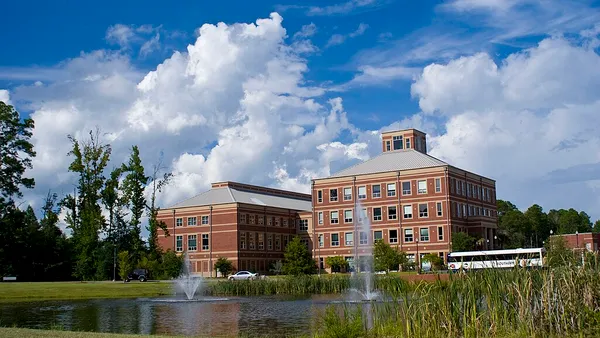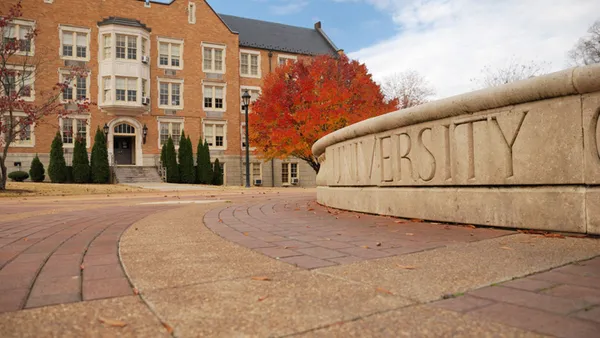Dive Brief:
- Stanford University announced Tuesday that it has agreed to work toward buying the campus of Notre Dame de Namur University, a struggling Roman Catholic institution in Belmont, California, that is transitioning to offer mainly graduate programs and undergraduate completion programs.
- For Stanford, the purchase will help it expand its academics to Belmont, about a 30-minute drive northwest from the university. Notre Dame de Namur will receive cash it needs to expand its programs and stabilize its finances.
- Plans are still being hashed out for the campus, and the schools did not release the deal's financial terms. But Stanford said it could use the campus to extend the reach of the university's continuing education courses.
Dive Insight:
The two universities have signed an agreement that gives Stanford exclusive rights to buy the Belmont campus through June 15, 2025, a Notre Dame de Namur spokesperson said in an email. The agreement also "secures NDNU's immediate future" by providing the university with financial resources, the spokesperson said.
Notre Dame de Namur is one of several private nonprofit universities that announced they were struggling financially during the pandemic. Like other institutions, the school's troubles predated the health crisis.
Its enrollment slid from 2,030 students in the fall of 2013 to 1,363 students in the fall of 2019, according to federal data. Despite the declines, Notre Dame de Namur also increased spending on institutional grants and scholarships over that time.
In the 2014 fiscal year, the university spent $9.9 million on scholarships and grants and brought in nearly $40.2 million in tuition and fees. In the 2020 fiscal year, it spent $10.7 million on institutional scholarships and grants even though the amount it received from tuition and fees shrank to $30.5 million.
Scores of private colleges are experiencing similar enrollment declines. In turn, their tuition discount rates keep climbing as they hope to entice more students to their campuses with generous financial aid packages. But rising institutional grants cut into the schools' bottom lines, prompting some colleges to question whether these trends are sustainable.
In March 2020, the 171-year-old Notre Dame de Namur announced it was experiencing unsustainable enrollment declines and a financial crisis. "We are no longer able to support the cost of our mission to provide a quality education to our students," it said in a statement.
Nearly a year later, Notre Dame de Namur announced it would continue primarily as a graduate and online university with some undergraduate degree completion programs. The school has pared down its offerings to graduate programs in business, clinical psychology and education.
While it makes sense for the institution to carve out a niche, it remains to be seen whether its bet on graduate online education will pay off, said Michael Horn, who has authored books on college and the future of education.
"It does make sense that this may have been their only path to maintaining solvency, and they have a certain angle that is attractive," Horn said. "But it doesn't feel like a guarantee by any means."
The university's graduate enrollment has fared only slightly better than its undergraduate enrollment. From the fall of 2013 to the fall of 2019, graduate student enrollment fell 30.5%, compared to a 34.5% decrease in undergraduates, according to federal data.
"This is the worry," Horn said. "You're already hemorrhaging students." While graduate enrollment has grown during the pandemic, the university will be in a competitive market for online programs, he said.
Notre Dame de Namur is planning on developing new programs that include a mix of in-person, hybrid and fully online instruction. The university will also be able to lease back some space on the campus for its operations once the sale is complete, the spokesperson said.
"This agreement between NDNU and Stanford gives NDNU the flexibility to grow again in new and exciting ways," Notre Dame de Namur President Beth Martin said in a statement. "We will be able to continue the programs for which we are so well known, and to add new programs directly targeted to changing student needs, including a mix of in-person, hybrid and fully online programs."
Meanwhile, Stanford will gain a foothold in Belmont, where it historically hasn't had much of a presence, according to the announcement. The university doesn't plan to move existing teaching and research activities off the main campus, but the new campus will give it additional space to enhance that work, Stanford Provost Persis Drell said in a statement.
Stanford will gather input from Notre Dame de Namur, the Stanford community, the city of Belmont and local residents to forge a campus plan. The university's provost will also work with a faculty advisory group to work out future academic uses for the grounds.














